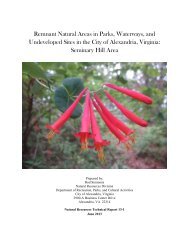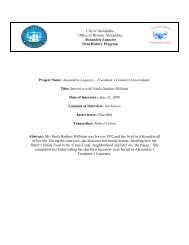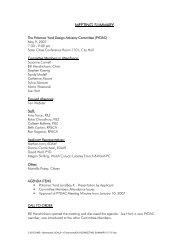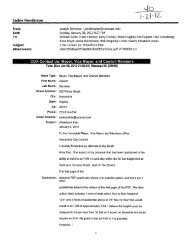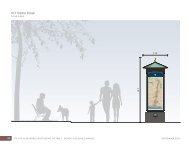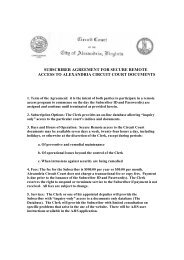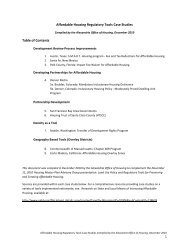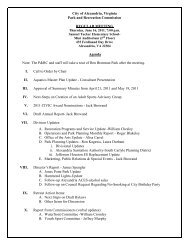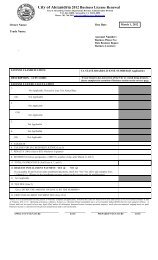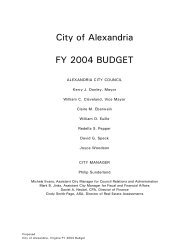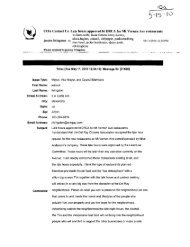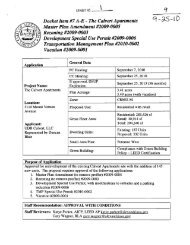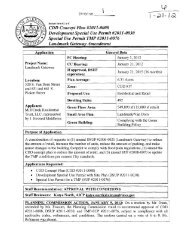LOYALISM IN EIGHTEENTH CENTURY ... - City of Alexandria
LOYALISM IN EIGHTEENTH CENTURY ... - City of Alexandria
LOYALISM IN EIGHTEENTH CENTURY ... - City of Alexandria
Create successful ePaper yourself
Turn your PDF publications into a flip-book with our unique Google optimized e-Paper software.
proposition: “As it would give me pleasure to<br />
serve with You, I have thought it very unlucky<br />
that it should happen at this time. I have been<br />
forced to decline it chiefly because I thought I<br />
could not give Satisfaction in general upon this<br />
occasion. For I should think Myself bound to<br />
oppose violent measures now.” He declined to<br />
be a representative <strong>of</strong> <strong>Alexandria</strong> to the<br />
convention because he knew his opinions were<br />
not in the majority. Most people who strongly<br />
believed in something would have jumped at the<br />
opportunity to have a powerful position to push<br />
their views, but Fairfax did not.<br />
Through a careful reading <strong>of</strong> the letters<br />
exchanged between Washington and Fairfax, it<br />
is easy to see why one man became the first<br />
President <strong>of</strong> the United States, while the other<br />
could never decide what to do with his life.<br />
Both men had the same resources available to<br />
them, but the difference lies in the way<br />
Washington and Fairfax conducted themselves.<br />
Washington was forthright and resolute in his<br />
opposition to British policy. He believed<br />
strongly in his principles and assumed a major<br />
leadership role in <strong>Alexandria</strong>’s Patriot actions.<br />
Fairfax, on the other hand, wavered constantly.<br />
He entered the ministry, becoming rector <strong>of</strong> the<br />
Fairfax Parish in 1790, but he second-guessed<br />
his religious faith and resigned the post in 1792.<br />
While he wrote forcefully in his opinion that<br />
more petitioning should be entered into instead<br />
<strong>of</strong> Resolutions, he wavered on these political<br />
points also. In the August 5th letter to<br />
Washington, Fairfax remarked: “You have no<br />
Reason Sir to doubt your opinion; It is that I<br />
have Reason to doubt mine when so many Men<br />
<strong>of</strong> superior Understanding think otherwise.” His<br />
lack <strong>of</strong> self-confidence is evident in this<br />
15<br />
passage. He considered changing his mind<br />
because many more men, smarter than him,<br />
disagreed with him. In the prologue <strong>of</strong> the book<br />
<strong>of</strong> letters, Donald Sweig wrote about Bryan’s<br />
lack <strong>of</strong> conviction in his opinions. Sweig<br />
pointed out that Fairfax “shied away from<br />
political <strong>of</strong>fice or public conflict. He rose no<br />
higher than a justice <strong>of</strong> the county court. His<br />
actions reflected in nearly every letter show<br />
insecurity, timidity, and a lack <strong>of</strong> resolve about<br />
his feelings.” Fairfax was more concerned with<br />
keeping Washington as one <strong>of</strong> his friends, than<br />
stirring up political debate. If Fairfax had been<br />
a different type <strong>of</strong> person, and strongly<br />
supported his opinions at the meeting <strong>of</strong> the<br />
freeholders, perhaps the Fairfax Resolves would<br />
have been debated, and the final draft less<br />
radical. With no one willing to stand up for the<br />
less radical perspective, Washington, Mason,<br />
and the other radicals faced no solid opposition<br />
to their views.<br />
Nicholas Cresswell and Bryan Fairfax<br />
were examples <strong>of</strong> two different types <strong>of</strong><br />
Loyalists: Cresswell was the recent British<br />
immigrant who regarded the colonists as<br />
scoundrels; Fairfax was the <strong>Alexandria</strong>n who<br />
spoke <strong>of</strong> moderation. Harry Piper represented<br />
yet another category. He was a Patriot in public,<br />
but he worried about the effects <strong>of</strong> non-<br />
importation associations that <strong>Alexandria</strong><br />
adopted. His letters show a man who was more<br />
concerned with his economic well-being, than<br />
with the colonial cause. As discussed earlier in<br />
the paper, Piper recorded the failure <strong>of</strong> the Non-<br />
Importation Association in <strong>Alexandria</strong>. Piper<br />
was one <strong>of</strong> the principal tobacco buyers in<br />
<strong>Alexandria</strong>, but he found it extremely difficult<br />
to do business in the late 1760s and 1770s. He



